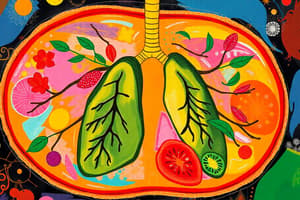Podcast
Questions and Answers
What is one way we determine if something is alive?
What is one way we determine if something is alive?
- Sound made by the object
- Size of the object
- Visible movement (correct)
- Color of the object
Molecular movements are necessary for life.
Molecular movements are necessary for life.
True (A)
What do we call the processes that maintain living organisms?
What do we call the processes that maintain living organisms?
Life processes
What is the source of energy that organisms need for maintenance processes?
What is the source of energy that organisms need for maintenance processes?
The process of acquiring oxygen for breakdown of food is called _____
The process of acquiring oxygen for breakdown of food is called _____
Match the following life processes with their descriptions:
Match the following life processes with their descriptions:
What happens when an organism's body size increases?
What happens when an organism's body size increases?
Flashcards are hidden until you start studying
Study Notes
What are Life Processes?
- Movement is not the only indicator of life, molecular movement is essential and occurs in all living organisms.
- Life processes are maintenance functions that occur in all living organisms to prevent breakdown and damage.
- Energy is required for life processes and is obtained from food sources outside the body.
- Food is broken down and converted into a uniform source of energy to fuel molecular movement and growth.
- The oxidation-reduction reaction is a common chemical method for breaking down molecules, often using oxygen from the environment.
Respiration and Cellular Needs
- Respiration is the process of acquiring oxygen and using it to break down food for cellular needs.
- Single-celled organisms directly exchange materials with their environment, but multi-cellular organisms require specialized systems.
- Multi-cellular organisms have specialized tissues and organs for function, including food uptake, gas exchange, and waste removal.
Studying That Suits You
Use AI to generate personalized quizzes and flashcards to suit your learning preferences.




